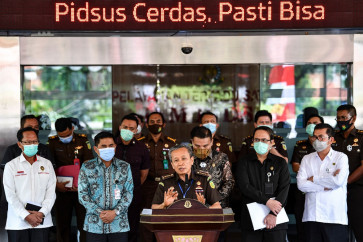Popular Reads
Top Results
Can't find what you're looking for?
View all search resultsPopular Reads
Top Results
Can't find what you're looking for?
View all search resultsPursuing the illegal proceeds of fraud
Within the existing legal framework, investigators face limitations in tracing and ensureing the forfeiture of illicit assets from fraud offenders, in particular when the situation necessitates the use of the nonconviction asset forfeiture mechanism.
Change text size
Gift Premium Articles
to Anyone
 Everyone involved: The junior attorney general for special crimes, Ali Mukartono (center), briefs the press regarding the investigation into prosecutor Pinangki Sirna Malasari, who allegedly accepted bribes from graft convict Djoko S. Tjandra. The Attorney General’s Office is involving the Corruption Eradication Commission, the National Police, the Prosecutor Commission and the Office of Coordinating Political, Legal and Security Affairs Minister in the case for the sake of transparency. (Antara/M Risyal Hidayat)
Everyone involved: The junior attorney general for special crimes, Ali Mukartono (center), briefs the press regarding the investigation into prosecutor Pinangki Sirna Malasari, who allegedly accepted bribes from graft convict Djoko S. Tjandra. The Attorney General’s Office is involving the Corruption Eradication Commission, the National Police, the Prosecutor Commission and the Office of Coordinating Political, Legal and Security Affairs Minister in the case for the sake of transparency. (Antara/M Risyal Hidayat)
A
fter 11 years on the run, fraud convict Djoko S. Tjandra was finally apprehended by the Indonesian National Police with the assistance of Malaysian authorities.
In 2009, the Supreme Court ruled that Djoko played a role in the Bank Bali scandal (also known as Baligate), which caused state losses of about Rp 546.4 billion (US$80 million), and sentenced him to two years in prison, but he fled the country just before the verdict was issued. He later obtained citizenship of Papua New Guinea, which created barriers for his extradition and incarceration.
Generally, fraud consists of three major steps: the act, concealment and conversion. Activities such as theft or embezzlement, including its proceeds, need to be concealed to avoid detection using various means such as record manipulation and money laundering before the money is spent for personal benefits (e.g. houses, cars, etc.). The sheer amount of embezzled money in the Bank Bali scandal should raise questions about who received the money and how it was transmitted to the recipients.
The fact that Djoko managed to disappear overseas for over a decade and was able to travel to and from Indonesia undetected implies that had had assistance from people with means and power. Several high-ranking government and law enforcement officers have been named suspects for their alleged involvement in Djoko Tjandra’s disappearance.
As the investigation into the disappearance of Djoko resumes after his recent arrest in Malaysia, it has been suggested that there may be more corrupt government officers involved than was previously thought. One of the critical steps in an investigation of this kind is to trace the flow of the illicit assets and return them to the state. Tracking down and ensuring the forefeiture of the illicit assets of a convict like Djoko Tjandra is, in itself, a challenging task, but achieving the forfeiture of such assets from co-conspirators can be even more challenging.
Assets from criminal acts are required to be forfeited in many countries to deter fraud and demonstrate that “crime doesn’t pay”. Law enforcement is focusing not only on apprehending criminals but also on uncovering ill-gotten gains and ensuring their forfeiture. Generally speaking, forfeiture is the seizure of property associated with criminal activity by the government after obtaining a conviction as part of the defendant’s sentence (i.e., criminal forfeiture).
Typically, if the suspected corrupt government and law enforcement officers in the Djoko Tjandra case are found guilty of a crime (e.g., corruption, money laundering), then they will be required to forfeit assets accordingly. In this process, the role of the PPATK as the country’s Financial Intelligent Unit (FIU) is crucial in analyzing and investigating corrupt officers’ suspicious financial transactions related to money laundering offenses.
















